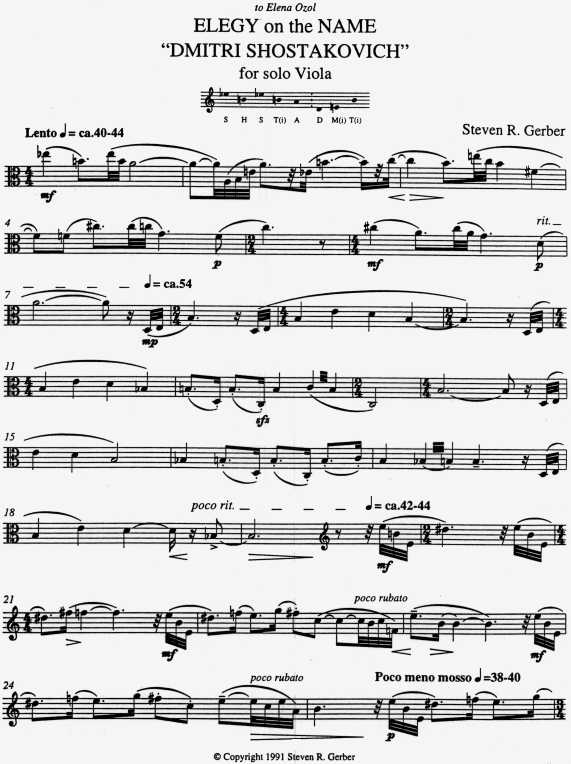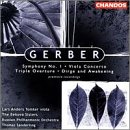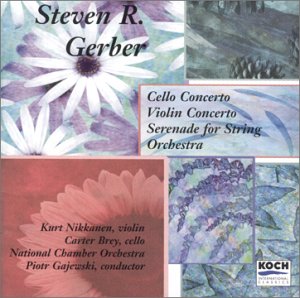Electronic
Dialogues/13
Steven
R. Gerber
|
Steven
R. Gerber's music has achieved international recognition recently as a
result of two CDs of his orchestral music released on Chandos and KOCH
International Classics. Chandos has issued his Symphony #1, "Dirge
and Awakening," Viola Concerto, and Triple Overture, played by the Russian
Philharmonic Orchestra under Thomas Sanderling, with Lars Anders Tomter,
viola, and the Bekova Sisters Trio, and the CD has received rave
reviews in a large number of magazines, newspapers, and websites in Great
Britain and the U.S. Under a grant from the Aaron Copland Fund, KOCH
has just released his Violin Concerto, Cello Concerto, and Serenade for
Strings, with the National Chamber Orchestra under Piotr Gajewski and soloists
Kurt Nikkanen and Carter Brey.
Gerber has written for many of the major performers of our time.
In addition to the concertos written for Nikkanen and Brey, he wrote his
String Quartet #4 for the Fine Arts Quartet, his Viola Concerto for Yuri
Bashmet, who premiered it at his festival in Tours, and several works for
Russian violinist Tatyana Grindenko. His works have also been performed
by such groups as the Knoxville Chamber Orchestra under Kirk Trevor, Philharmonia
Virtuosi under Richard Kapp, and The Russian National Orchestra under Mikhail
Pletnev. Most recently, he received a commission from Concertante
Chamber Players for a work entitled "Spirituals" for clarinet and string
quartet, premiered by them in 2001 in Harrisburg, New York City, and the
Library of Congress in Washington, D.C.
Born in Washington, D.C. in 1948, Gerber now lives in New York City.
He has degrees from Haverford College and from Princeton University, which
awarded him a 4-year fellowship for graduate studies. His works have
been played throughout the U.S., Europe, and the former Soviet Union, where
he has toured frequently and had literally dozens of orchestral performances
and
many concerts
of his own chamber and solo works. Several solo and choral works
of his have been recorded on CRI and the French label Suoni e Colori.
His works are published by MMB, Boelke-Bomart/Mobart, and APNM. Currently
he is working on a clarinet concerto for Jon Manasse and has been commissioned
by Voice of America to write a new work for its 60th anniversary. |
|

|
S21:
You are a remarkably prolific composer and have created works in a wide
variety of forms—orchestral, chamber, choral, solo. Do you prefer
one form over another?
SRG: For a
long time I preferred to write solo, vocal, or chamber works and
didn't expect to write much for orchestra. When I began my Symphony
in 1988, at the age of 40, I had written only one previous work for orchestra,
some settings of Wallace Stevens for soprano and orchestra, which were
still unplayed. (I had to wait nearly 15 years for them to be performed;
oddly enough they were given two performances in Ukraine during the same
year with two different orchestras, singers, and conductors.) I had
no idea when I would hear the Symphony, or my next work, a Serenade for
Strings, but I got lucky very soon after they were finished and they were
both played a lot, first in Russia, and then, in the case of the Serenade
in the U.S. too, and those performances inspired me to write a lot more
for orchestra.
Since then
I have enjoyed alternating between orchestral works and works for much
smaller groups, but I think my greatest affinity may be for writing pieces
for solo viola, solo oboe, etc. At one time I enjoyed writing songs
and choral music more than anything else, because the texts made me feel
a connection to the world in a way I didn't feel with instrumental music,
but I haven't written for voice since 1988.
|
S21/:
How do you decide what form a musical idea may take? What are some
of the external things that inspire you to create music?
SRG:
I try to let the musical material decide the form for me. Sometimes,
though, it is more of a challenge to set myself a technical problem in
advance and see if I can make it work. That can be anything from
writing a passacaglia to writing for a difficult instrumental combination
to figuring out how to get from a beginning or a middle section that are
already written to an end that is at least sketched out.
Actually
I feel more like a composer when I am solving a technical problem than
when an inspiration arrives out of nowhere; one of my composer friends
told me this was puritanical of me. I don't think anything external has
influenced me as far as I can recall, though in Russia, in particular,
interviewers are always asking me whether I am inspired by nature or by
the political relations between the U.S. and Russia. Once I did get
a melodic-harmonic idea in a dream and used it in a piece called
"Dreamwork."
S21/:
What were your earliest musical influences? Whose work has influenced
you
most and why?
SRG:
When I was around fourteen I went to a summer music camp in Stockbridge,
Massachusetts, called Indian Hill, and that was where I first saw actual
composers. At the time I was just a pianist, but it was when I came
home from camp that it first occurred to me to compose something.
It was
somewhere
around that time that I first got to know the Schoenberg Op. 19 pieces
and the first page of the Leon Kirchner Piano Sonata, both of which made
a big impression on me. Not long after that I continued my piano
studies with the wonderful composer and pianist Robert Parris in my hometown,
Washington, D.C. He taught me those Schoenberg pieces, the Webern
Variations
Op. 27, and
the Copland Variations, as well as the traditional repertoire, and all
that music certainly influenced me a lot, as did his music. It was
through the music he wrote in the 60s that I became especially influenced
by Bartok; some of his works of that time are like a more atonal Bartok.
In
fact when
I first became realy serious about writing music, when I was 17, I wanted
to write music along the lines of the Bartok 3rd Quartet, whose one-movement
form I particularly admired, but less tonal and without the folk material.
The contemporary works I loved most at that time can probably be called
abstract expressionist -- pieces like Yehudi Wyner's Concert Duo, the first
movement of Billy Jim Layton's String Quartet, Elliott Carter's First Quartet,
Parris's Solo Violin Sonata and Duo for Flute and Violin, and Kirchner's
First Quartet and parts of his Sonata Concertante.
I had absolutely
nothing against tonality but didn't really think there was much that was
still fresh that could be done with it (I certainly don't agree with
that any more); I thought that the theory of twelve-tone music made little
sense, though I did like some of the music itself, at least up to a
point; and
I felt completely alien from Cage and the whole experimental school that
was inspired by him. So I really saw no other path than some kind
of non-twelve-tone atonality. I was quite surprised later to find myself
first writing sparer, less expressionistic music; then writing some 6-tone
serial pieces; then writing 12-tone pieces; several years later moving
towards tonality, sometimes of a totally diatonic kind; and then using
to a limited degree some minimalist techniques, even though I dislike minimalist
music.
I
guess part of the fun for me about being a composer is trying to incorporate
things that I don't feel an immediate affinity for and seeing if I can
make them work in my music. I must say though that is disturbing
to me to find that so many composers have been moving in the general direction
I
have described above
-- I'd rather think of myself as an iconoclast than as part of a larger
trend.
S21/:
What was the first piece of music you ever wrote? Do you remember
what it
felt like?
SRG:
When I came home in 1962 from Indian Hill music camp, after an abortive
attempt to write something which I quickly realized was a steal of a chromatic
theme from the Bach b-minor mass, I began writing an atonal fugue.
I've kept it, though heavily revised. It became part of a Violin
Sonata I wrote in college, with a sonata-movement interposed between the
two parts of the fugue, and I revised it again a few years ago. I
guess it felt very natural to be writing music, but I think that from the
beginning I was obsessed by the problem of making the pitches in atonal
music make sense in anything like the degree they make sense in good tonal
music.
S21/:
What do you consider your most important formal training?
SRG: The
best training I had was my piano and composition studies with Robert Parris.
Because I had already studied piano with him in high school, when a year
later I first showed him my compositions, he already knew me well.
Part of the problem with academia is that you are assigned to composition
teachers you may or may not have anything in common with, who may or may
not be sympathetic to what you are doing, and who know little about you
overall as a musician. With him there were none of these problems,
and he became a real mentor for me. I had some other good composition
teachers too, but didn't develop a long-term relationship with any of them.
S21/:
Who are some younger composers whose works interest you?
SRG:
Since I'm 53, "younger" takes in a lot of territory. I have to qualify
any comments I make by saying also that the amount of new music out there
is so vast that it's impossible to keep up with it. Also, I tend
to be skeptical of anything new, so sometimes it takes me a while to come
to like something I've never heard before. In general, furthermore,
I'd have to say that there are few if any contemporary composers whose
whole body of work appeals to me, or of whom I even like a large number
of pieces, but there are many contemporary composers of whom I deeply admire
and love one or two or three works. Among younger composers, I would
single out two works, Aaron Kernis's
First Quartet
and Thomas Ades's "Asyla," which, whatever their faults, achieve a degree
of grandeur without grandiosity and have repaid many listenings. Among
older composers, some alive, some not, there are a few I'd like to recommend
to your readers by composers whom I generally don't like --
Gorecki's
two string quartets, Schnittke's first Concerto Grosso, Arvo Part's "Fratres"
in its violin and piano version and "Tabula Rasa," Lutoslawski's early
Concerto for Orchestra. These to me are classics. I've also been
quite affected by two works on a Kronos Quartet CD, Sculthorpe's
8th Quartet and Salinnen's 3rd.
S21/:
Most establishment music organizations are fairly conservative and tend
to play music they think will attract an audience. That usually translates
into a lot of Brahms, Beethoven and Mozart. How difficult is it to
get contemporary works played and heard? What can be done about it.
SRG:
What needs to be done is to educate both audiences and performers in twentieth-century
music. Since there is little music education at all, this is not easy.
But it is shocking that wonderful performers can still go to Juilliard,
for example, and learn to play so little contemporary or even
twentieth-century
music, and it is even more shocking how little of this music so many of
these performers are familiar with. Fortunately, there are many exceptions,
and I've been lucky myself to have some wonderful performances by several
musicians there, but it still amazes me how little
curiosity
so many musicians show about this music -- and often about any music not
written for their own instrument.
In
recent years I have not had a lot of trouble getting my music played and
recorded, but what composer thinks his music is played nearly enough?
S21/:
Simon Rattle remarked in an interview with us that there are few periods
in history when so many kinds of music were being produced at the same
time as today. Do you see any patterns that suggest a trend or direction?
SRG: Frankly,
I have no idea where music is going; it is hard enough to keep up with
what has already happened. It was only around 1988 when I fell in
love with classic jazz, and catching up with all of that is time-consuming.
Then, a couple of years ago, I got hold of the Smithsonian Anthology of
World Music CD, which I also fell in love with, and realized there was
a vast amount of interesting music from all over the world of which I would
only be able to scratch the surface. So, what with listening to all
that plus all the classical music there is to hear and re-hear (I have
always loved discovering for myself forgotten composers of the past, even
if most of them turn out to be justly forgotten), and what with writing
my own music, I try not even to think about where music is going.
S21/:
This is a tough question, but what would be your five Desert Island discs?
SRG:
It's very tough, since I could easily pick a thousand. I'd say at the moment:
Beethoven Symphonies
# 7 and 9 (I still rate Beethoven way above everyone else)
Le Sacre du
Printemps and Petrouchka if they are on one disc
La Mer coupled
with Debussy's late sonatas
Smithsonian
Anthology of Clasic Jazz
Smithsonian
Anthology of Big Bands
I'd love to
include also the Smithsonian Anthologies of Jazz Piano and World Music,
not to mention gobs of Beethoven Brahms, etc. etc.
S21/:
What are you working on now? How is it going?
SRG:
I have just been commissioned by Voice of America to write a work for their
60th anniversary, and I am very excited about this project, in light of
9/11. It is going very well, unlike a Clarinet Concerto I am working
on for the wonderful young clarinetist Jon Manasse, which is going quite
slowly.
For a complete discography and
list of works, visit Steven Gerber's Web site:
http://www.stevengerber.com

|
Viola
Concerto
Composer: Steven R. Gerber
Conductor: Thomas Sanderling
Performer: Lars Anders Tomter,
Alfia Bekova, et al.
Chandos - #9831 |

|
Violin
Concerto
Composer:
Steven R. Gerber
Performer:
Kurt Nikkanen, Carter Brey
Koch International
Classics - #7501 |
|

